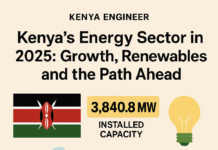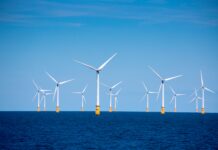Last Updated 1 week ago by Kenya Engineer
When U.S. President Donald Trump addressed the United Nations General Assembly on 23 September 2025, he described climate change as “the greatest con job ever perpetrated on the world.” He went further, dismissing carbon footprints as a “hoax” driven by “evil intentions.”
These remarks strike at the heart of global climate cooperation. For a continent like Africa—responsible for less than 4% of global greenhouse gas emissions but suffering some of the harshest impacts—this rhetoric is alarming. For Kenya, which has invested heavily in renewable energy and positioned itself as a continental leader in green growth, the stakes are particularly high.
The Global Stakes: Science vs. Skepticism
Scientific consensus is clear: climate change is a reality. Rising global temperatures, erratic rainfall patterns, worsening droughts, destructive floods, and rising sea levels are evidence of a warming planet. The Paris Agreement was designed to address these risks collectively, but when a major emitter like the U.S. questions the very existence of the problem, momentum weakens.
Trump’s position emboldens industries and governments resistant to decarbonisation, undermines the credibility of climate science, and threatens to erode international financing for green projects.
Risks to Africa
Africa is already highly exposed to climate risks:
-
Food insecurity from prolonged droughts in the Horn of Africa.
-
Displacement and destruction from floods in East Africa.
-
Coastal vulnerability from rising sea levels.
-
Health risks from the spread of climate-sensitive diseases.
If climate finance and international support shrink, African nations may be left to shoulder the burden of adaptation without adequate resources. This could slow renewable energy projects, hinder climate-smart agriculture, and weaken the continent’s infrastructure resilience.
Kenya’s Position
Kenya has made significant progress in climate leadership. With more than 80% of its electricity generated from renewable sources—geothermal, hydro, wind, and solar—the country has shown that a green economy is possible. It has also enacted the Climate Change Act and hosted the Africa Climate Summit in 2023, which produced the Nairobi Declaration.
Yet Kenya remains vulnerable. The 2022–2023 drought left millions food insecure, while recent floods displaced thousands and destroyed critical infrastructure. Meeting national climate targets will require tens of billions of dollars, alongside strong partnerships and access to clean technologies.
The Path Forward
For Kenya and Africa, Trump’s words must not dictate our destiny. Instead, they highlight the need to:
-
Mobilise Domestic Resources – Expand green bonds, carbon trading, and public-private partnerships to reduce reliance on uncertain donor funding.
-
Deepen African and South-South Cooperation – Build alliances with countries in the Global South to share technology and co-finance clean energy infrastructure.
-
Invest in Local Innovation – Train engineers, scientists, and innovators to design homegrown climate solutions that suit Africa’s unique contexts.
-
Climate-Proof Infrastructure – Ensure roads, bridges, dams, and power systems are designed with resilience in mind. Engineers have a central role to play here.
-
Use Climate Justice Mechanisms – Press for accountability from major emitters through global forums, climate litigation, and diplomatic platforms.
Trump’s dismissal of climate change as a “hoax” may resonate politically in the U.S., but for Kenya and Africa, the consequences are real and urgent. Climate change is not a theoretical debate—it is an everyday challenge threatening food security, infrastructure, and livelihoods.
Kenya’s engineers, policymakers, and citizens must stay the course. Regardless of wavering commitment from major emitters, we must advance renewable energy, resilient infrastructure, and sustainable growth. The future of our continent depends on it.

























